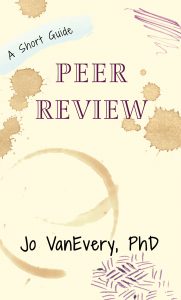As I was preparing the first iteration of my class on Dealing With Reviewer Comments, I asked some friends and colleagues to recommend resources for dealing with feedback. That’s how I discovered Liz Lerman’s Critical Response Process.
Lerman developed this process for artists, and assumes a situation where you are actively seeking feedback from people who are in the room with you. The process uses a facilitator who explains and guides the process while ensuring that everyone sticks with the general principles.
It doesn’t map directly onto the situation you find yourself in as an academic writer, receiving comments from anonymous reviewers. And yet, reading about this process made me very excited. I wholeheartedly agree with the principles, especially the central one: this is your writing. You are the creator and as such you need to remain central in this process. You need to remain in control of your creation.
A central feature of Lerman’s process is questions.
You, the author, need to ask specific questions that will help you improve your work. You don’t want to be too specific nor effectively ask the people giving feedback for their approval. But you do want to know if specific things you did worked. You made decisions. You had a goal in mind. It can be really helpful to get specific feedback on how well what you did achieved your objective.
For example, if we were talking about baking instead of writing, if you developed your specific cake recipe with a particular texture and mouth-feel in mind, you might want to ask for feedback specifically on the texture. Perhaps something like “What did you think of the texture?” or even “How would you describe the texture?” would direct your responder away from flavour or looks for a bit and get them to focus specifically on this particular feature.
Starting with a somewhat general question enables you to follow up with something more specific depending on the answer. You don’t want to be too directive, giving away your objective. Rather you want to direct their focus and then hear their experience of that particular part of the work.
Of course the person giving the feedback will have issues that concern them. These may or may not align with what you most want feedback on but it might be nice to hear them.
Lerman’s process again focuses on questions. Instead of responders just launching in with their opinions, she has them frame neutral questions. The purpose is the same as for the other questions: the author remains in control of the writing.
Let’s return to the cake example. You’ve asked your question about texture and explored the feedback on that topic. However, your responder has some opinions about the look of the cake. Instead of telling you their opinion, they would frame a neutral question. Perhaps “What effect were you trying to achieve with the presentation?” It may be that because you were more concerned with getting some feedback on the texture and flavour of the cake, you didn’t really think much about the presentation. If so, you would say so. This would mean that the opinion is not really necessary because that aspect of the cake is not in its final form. Or, you might explain what you were thinking or ask for their feedback on the look.
Opinions rest in values. Knowing what you were aiming for helps sort out differences in aims or values from problems of achieving the aims you set for yourself with this piece of writing.
Adapting Lerman to our purposes.
If you are supervising student writers, or if you have a writing group where you share writing drafts with colleagues for feedback, there is real value in using Lerman’s process as she describes it. She and her colleague John Borstell have published a new book in 2022, Critique is Creative: The Critical Response Process in Theory and Action (Wesleyan University Press), with contributions for many who have used the process, including academics.
I have incorporated these principles into Peer Review (A Short Guide) which was published in eBook and paperback on 15 November 2019. This Short Guide provides practical tips for both authors and reviewers, and treats peer review as an editorial process which supports academic writing. Now available as a 2-book set: The Publishing Bundle including Scholarly Publishing!
If you need further help and suppor with the Peer Review process, I also offer the Dealing With Reviewer Comments Live Class, featuring group coaching and helpful downloadable content.
Related posts:
If you are dealing with peer review feedback on an article manuscript (Revise & Resubmit) you might also find these posts helpful:
Communicating manuscript edits
Edited January 26, 2017. Information about Peer Review (A Short Guide) added 8 October 2019. Re-edited to add new Lerman book and new Bundle e-book options, October 2022. Re-edited and added to the Spotlight on Peer Review, October 2022.










Leave a Reply